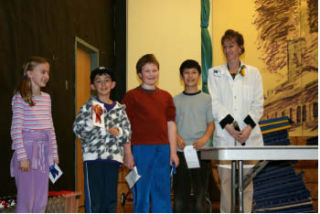Mercer Island School Board members Janet Frohnmayer, Lisa Strauch Eggers and Islander Middle School principal Mary Jo Budzius traveled to San Diego to tour a school system seen as the school of the future.
The trio walked away from High Tech High excited about the possibilities which could be implemented in Mercer Island schools. Those included a strong fostering of teacher mentoring and honing teacher skills, project-based classrooms and using those projects to help benefit the local community.
“Within what they do, there are exciting things we could borrow. There was very much a culture of mentoring and honing their practice,” said Frohnmayer of HTH’s teaching practices. Administrators at HTH found that it is more beneficial to help teachers grow than have teachers earn outside degrees before adjusting to a very different style once in a classroom. Budzius said she was impressed with this focus.
“I think there are ways to adopt the values they had. We have a lot of the essential tenants already,” she said. “It’s a pretty dynamic place where the teachers really bought in.”
High Tech High began in the late 1990s and opened the first high school in 2000 as a groundbreaking new way to teach through highly personalized, project-oriented classrooms. There are now eight High Tech schools across southern California with 2,500 students. One hundred percent of HTH’s students are college-accepted, with around 80 percent heading to four-year institutions, according to the school’s Web site. Frohnmayer said what is extremely impressive is that the student population specifically reflects the demographics where the school is located, with approximately 40 percent of the students qualifying for free or reduced lunches. She said these are students who often struggle in traditional school formats.
“It’s very heartening to think someone finally cracked the code,” said Frohnmayer.
The school is a charter school, exempting it from certain state requirements, and enrollment is based on a lottery system. In 2004, the Washington Legislature passed a charter school law, but it was overturned by voters as part of a referendum vote in the fall of 2004, making Washington one of 11 states in the nation without a law authorizing the schools.
The original founders of HTH were concerned by the lack of women and ethnic minority groups going into math, science and engineering fields, and saw their curriculum as a way to foster interest in those fields. Today, with five high schools, a student’s work is integrated with all the typical subjects in a radically different format. Students are assessed throughout the year on various projects with an individual portfolio and presentations. While grades in a traditional report card format do not exist at HTH, transcripts are sent to colleges the same as any other school, said Frohnmayer.
Eggers said she was impressed by the teacher learning communities at HTH. She said she also liked how subjects were taught together, such as math and physics, and that classes were not afraid of mixing things together, like art projects based on calculus, enhancing student learning.
Each of HTH’s classrooms are project-based, meaning that teachers create projects and students work on those throughout the year. Students tackle a real-world problem through these projects while learning the concepts behind it during the process, the opposite of many traditional classrooms where students tackle a theory before applying it. All three said they would like to see some portion of the project-based idea brought to the Island, even if it means only one project per year for students.
The trend toward alternative school formats began in the late 1990s and has progressed since then with a multitude of options for students, especially in urban areas. Locally, students have a variety of options for those interested in a classroom other than the traditional. Aviation High School, a part of the Highline School District, is one such school.
Other public but limited schools in the area include: Tacoma School of the Arts, Center School in Seattle — with a focus on access to the arts, International School in Bellevue and Todd Beamer High School in the Federal Way School District. At Todd Beamer High, students can enroll in one of four academies. In the MISD, students can choose to go to the Crest Learning Center, which offers a smaller, more intimate classroom experience.
For more information, go to www.hightechhigh.org.



